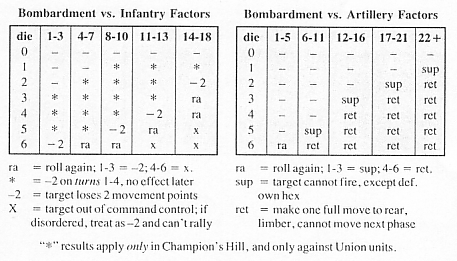Unconditional Surrender/Champion's Hill
Additional Optional Rule
17.4 Bombardment
Bombardment allows artillery to attack
separately from infantry, Bombardment will
slow down enemy infantry, sometimes putting it
out of command control; it will prevent enemy
artillery from firing, or force it to retreat. It
never inflicts strength losses. This rule is
optional in the Fort Donelson game but must be
used in the Champion's Hill game
Bombardment takes place at the end of each
side's First Combat Phase, after combats
involving infantry. Both sides bombard in each
side's player-turn. The results last until the end
of the next First Combat Phase (the other
player's). All fires are considered to occur
simultaneously, although the phasing player
resolves his first.
17.41 Targets: Infantry or artillery can he
attacked by bombardment; leaders cannot. A
bombardment attack is made against one unit,
not all units in the hex. The player firing says
which unit he wishes to attack. The target
cannot have been involved in a battle in
that phase. (In the Champion's Hill game,
Union units sometimes are inverted. Inverted
units can be bombarded.) If several are
stacked, the Confederate player chooses one,
e.g., saying, "the second unit in the stack,"
still without seeing them If he happens to
choose a leader, the bombardment has no
effect. All artillery bombarding the same
target is added together into one attack.
17.42 Requirements for Bombardment: Artillery
must be in battery to bombard. It must have a
clear LOS to the target Only units which did
not give support fire that phase can bombard.
Each 'Unit bombards just one target per phase.
17.43 Bombardment Tables: There are
two tables, one for infantry targets, the
other for artillery. The player firing adds
up the factors attacking. He halves the
bombardment factor of any non-rifle bat-
tery (i.e., any without an asterisk by its
bombardment factor) which is firing at
range five or greater. (Drop fractions.) He
then finds the corresponding column of
the table. In the Fort Donelson game, shift
one column to the left when a target inside
a rifle pit is bombarded only across rifle
pit's (The extreme left column is not af-
fected.) He then rolls one die, subtracting
one if the target is in woods (not if the
target is only in Thicket) and reads the re-
sult. Results are explained on the table. Note
that because results last through the next First
Combat Phase, artillery suffering "sup" results
will not be able to bornbard then It can still
bombard in this phase because fires are
simultaneous.
Note that in the Champion's Hill game there
are many "*" results. These count as "-2" on the
first four turns of the game only, against Union
units only. Against Confederate units, and
against anybody on turn 5 and after, they have
no effect. (During the early hours of the battle
the Union troops were unsure of the Rebel
strength and positions, and advanced
cautiously, tending to go to ground whenever
they contacted artillery.)
Bombardment Tables
Shift one column left if target protected by rifle
pits ( 1st col. no change) -1 to die roll if target
in woods.
Halve bombardment factors on nonrifled
batteries at ranges 5 and up.
Target cannot have been attacked and
bombarding units cannot have fired in this
phase.

NB submitted by John Kula ([email protected])
on behalf of the Strategy Gaming Society
(http://pages.about.com/strategygames/),
originally collected by Andrew Webber
([email protected])
